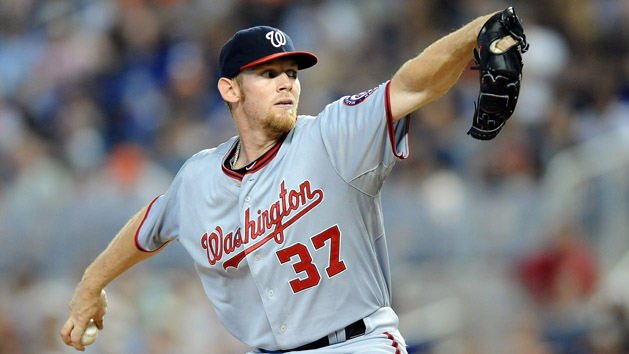
Going into his 21st start of the season, Tuesday against the Philadelphia Phillies, right-hander Stephen Strasburg is at 117 1/3 innings. So that means he’s 42 2/3 away from being shut down for the season, right?
Not so fast.
The 160-inning limit that supposedly was placed on him for this season became the marker only because teammate Jordan Zimmermann, like Strasburg coming back from Tommy John surgery, pitched 161 1/3 innings last year.
General manager Mike Rizzo has never said 160 would be the stopping point. Rizzo has said he will shut down Strasburg when he deems it’s time and insists it is his decision alone — not Strasburg’s, not manager Davey Johnson’s and not ownership’s.
Based on an average of six innings per start, Strasburg’s final start would be around the first week of September if he is limited to 160 innings. If Rizzo decides to extend Strasburg to 180 innings, his last start would be around Sept. 19 — two weeks before the end of the regular season.
One way the Nationals appear to be slowing Strasburg’s workload is by monitoring his pitch count. Johnson said it is something he watches with all his starters.
“I don’t want any of my young starters, who get a little bit tired, to get beat up,” Johnson said. “I am always looking for positive outings versus how many innings I can squeeze out of them.”
Strasburg has been made aware of this. In his last start, against the New York Mets on Wednesday at Citi Field, Strasburg was more pitch efficient by being more aggressive early in counts and challenging hitters.
“Good pitchers can get through seven (innings) under 100 pitches,” Strasburg said after a 94-pitch, seven-inning, 5-2 win over the Mets. “That was my goal. I didn’t want to go out there and have 100 pitches through five innings.”
Strasburg had thrown more than 100 pitches in each of his three previous starts and never got past six innings in any of them.
Johnson said he has changed his philosophy over the years in regards to pitch counts for starting pitchers.
“I did pitch limits (in the past), but my pitch limit was always a lot higher,” Johnson said. “I have kind of modernized my dinosaur thinking. If they are around 100 pitches and they have gone seven innings, I am not going to let them throw 120 pitches or something like that.”
Johnson said pitch counts of 130 were more common back when he first started managing, but now 100 is the number everyone looks to when gauging the workload for a pitcher. If Strasburg gets well over 100 pitches at the six-inning mark, you can expect Johnson to take him out.
But when it comes to how many starts Strasburg will get down the stretch, Johnson has made it known recently he will not skip a start in order to get him into October, when the Nationals are on track to be in the playoffs.
“I am not going to treat him any differently because that would be unfair to him,” Johnson said. “That may look good on paper, but it would be very unfair to change what his work ethic wants him to do. He needs to pitch every fifth day. Any disruption to that would lead to a possible injury.”
Johnson did admit that he will make sure Strasburg doesn’t overextend himself in any one start. But deciding when to completely shut him down? That decision is above his pay grade.
“The only restriction I have been on is I have been a little quicker to hook him than I normally would, trying to save him some innings at the end,” Johnson said. “(But) that decision is made by people a lot smarter than me as far as to the welfare of the pitcher.”
Either way, the Nationals face a dilemma if they continue to have Strasburg take his regular turn. Unless they ease the innings limit, they almost certainly will be without their best pitcher in their first playoff appearance since the franchise moved to Washington in 2005.
